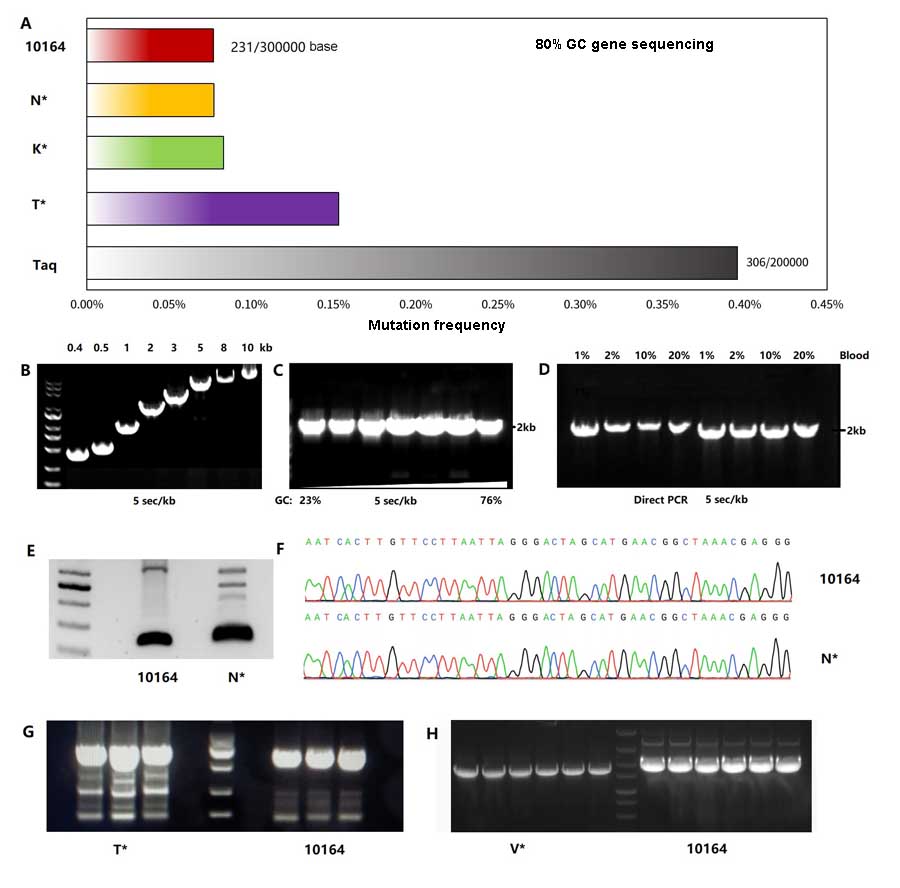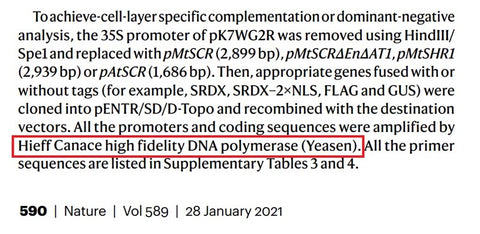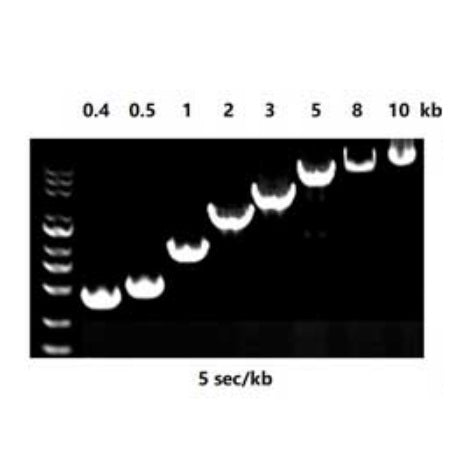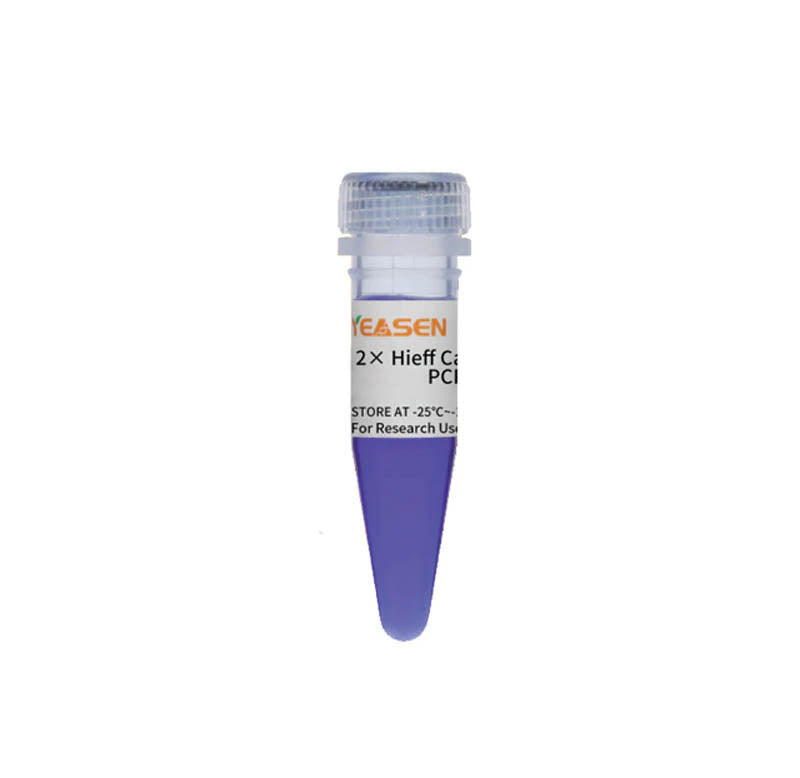Description
2× Hieff Canace™ AdvanceFast PCR Master Mix (With Dye) is a ready-to-use 2× pre-mixed solution containing Hieff Canace™ AdvanceFast High-Fidelity DNA Polymerase, dNTPs, and an optimized buffer system, which contains pre-added electrophoresis indicators. The pre-mix contains pre-added electrophoresis indicator, PCR products can be directly electrophoresed, the amplification products are flat ends. 2× Hieff Canace™ AdvanceFast PCR Master Mix (With Dye) has the advantages of quick and easy, high sensitivity, high specificity, good stability, etc., the reaction system can be added with only the primers and templates. In addition, the product also contains a specific protective agent, so that the premix can still maintain stable activity after repeated freezing and thawing.
Ultra-high fidelity: Low mismatch rate in mutation-prone high GC gene;
Fast speed: The speed is as fast as 5 sec/kb;
Wide applicability: It can be used to amplify genes with 20-80% GC content, and tolerate 20% blood and mouse lysates;
Good stability: Stored at 37°C for 7 days without affecting performance;
Easy use: Just adding primers and templates for amplification, with blue loading dye for direct electrophoresis.
Specifications
| Cat.No. | 10164ES01 | 10164ES03 | 10164ES08 |
| Size | 250 μL | 1 mL | 5×1 mL |
Figures

Figure: Hieff Canace™ AdvanceFast High-Fidelity DNA Polymerase has high fidelity compared to other brands' products (A). The assay was done by examining the mutation frequency of PCR products of 6 GC-rich (about 80%) segments amplified from the genomes of different species. The PCR products amplified by Hieff Canace™ AdvanceFast High-Fidelity DNA Polymerase were cloned into vectors, and 100 selected single clones for each sequence were subjected to Sanger sequencing.
Hieff Canace™ AdvanceFast High-Fidelity DNA Polymerase has high amplification speed (B), high GC amplification compatibility (C), and blood tolerance (D). Results from customers' PCR and sequencing show that Hieff Canace™ AdvanceFast High-Fidelity DNA Polymerase has good performance in PCR yields and specificity (E-H).

Storage
This product should be stored at -25~-15℃ for 1 years.
Instructions
- Recommended PCR reaction systems.
|
Components |
Volume(μL) |
Final concentration |
|
2× Hieff Canace™ AdvanceFast PCR Master Mix (With Dye)* |
25 |
1× |
|
Template** |
x |
- |
|
Forward Primer(10 μmol/L)*** |
2 |
0.4 μmol/L |
|
Reverse Primer(10 μmol/L) |
2 |
0.4 μmol/L |
|
ddH2O |
Up to 50 |
- |
Table 1 PCR reaction system
*In 1× premixes containing 2 mM Mg2+ and 200 μM dNTPs.
**Recommended range 10-200 ng, cDNA sample upload volume range not more than 1/10 of the reaction system, recommended 1-2.5 μL.
***The final primer concentration in the PCR reaction system ranges from 0.2-1 μM, and 0.4 μM is recommended.
- Reaction program.
|
Cycle step |
Temp. |
Time |
Cycles |
|
Initial denaturation |
98℃ |
30 sec |
1 |
|
Denaturation |
98℃ |
10 sec |
30-35 |
|
Annealing* |
60℃ |
5 sec |
|
|
Extension** |
72℃ |
5-10 sec/kb |
|
|
Final extension |
72℃ |
2 min |
1 |
Table 2 PCR reaction program
*Recommended temperature: 60°C, a temperature gradient can be set up to find the optimal temperature for primer annealing. The recommended annealing time is set to 5 sec and can be adjusted from 5-30 sec. Too long annealing time may result in diffuse amplification products on the gel.
**Extension time: Recommended 5 sec/kb, can also be extended to 10 sec/kb as needed.
Notes
- This product is for research use only.
- Please operate with lab coats and disposable gloves,for your safety.
Documents:
Citations & References:
[1] Dong W, Zhu Y, Chang H, et al. An SHR-SCR module specifies legume cortical cell fate to enable nodulation. Nature. 2021;589(7843):586-590. doi:10.1038/s41586-020-3016-z(IF:42.779)
[2] Sun L, Yan Y, Lv H, et al. Rapamycin targets STAT3 and impacts c-Myc to suppress tumor growth. Cell Chem Biol. 2022;29(3):373-385.e6. doi:10.1016/j.chembiol.2021.10.006(IF:8.116)
[3] Ye M, Xiong L, Dong Y, et al. The Potential Role of the Methionine Aminopeptidase Gene PxMetAP1 in a Cosmopolitan Pest for Bacillus thuringiensis Toxin Tolerance. Int J Mol Sci. 2022;23(21):13005. Published 2022 Oct 27. doi:10.3390/ijms232113005(IF:6.208)
[4] He Y, Zhou J, Fu R, et al. The application of DNA-HRP functionalized AuNP probes in colorimetric detection of citrus-associated Alternaria genes. Talanta. 2022;237:122917. doi:10.1016/j.talanta.2021.122917(IF:6.057)
[5] Guo L, Yang W, Huang Q, et al. Selenocysteine-Specific Mass Spectrometry Reveals Tissue-Distinct Selenoproteomes and Candidate Selenoproteins. Cell Chem Biol. 2018;25(11):1380-1388.e4. doi:10.1016/j.chembiol.2018.08.006(IF:5.592)
[6] Dou W, Zhu Q, Zhang M, Jia Z, Guan W. Screening and evaluation of the strong endogenous promoters in Pichia pastoris. Microb Cell Fact. 2021;20(1):156. Published 2021 Aug 9. doi:10.1186/s12934-021-01648-6(IF:5.328)
[7] Xiong Y, Yi Y, Wang Y, Yang N, Rudd CE, Liu H. Ubc9 Interacts with and SUMOylates the TCR Adaptor SLP-76 for NFAT Transcription in T Cells. J Immunol. 2019;203(11):3023-3036. doi:10.4049/jimmunol.1900556(IF:4.718)
[8] Huang L, Xiang M, Ye P, Zhou W, Chen M. Beta-catenin promotes macrophage-mediated acute inflammatory response after myocardial infarction. Immunol Cell Biol. 2018;96(1):100-113. doi:10.1111/imcb.1019(IF:4.557)
[9] Wang X, Du A, Yu G, Deng Z, He X. Guanidine N-methylation by BlsL Is Dependent on Acylation of Beta-amine Arginine in the Biosynthesis of Blasticidin S. Front Microbiol. 2017;8:1565. Published 2017 Aug 22. doi:10.3389/fmicb.2017.01565(IF:4.076)
[10] Yu P, Zhou L, Yang WT, et al. Comparative mitogenome analyses uncover mitogenome features and phylogenetic implications of the subfamily Cobitinae. BMC Genomics. 2021;22(1):50. Published 2021 Jan 14. doi:10.1186/s12864-020-07360-w(IF:3.969)
[11] Liu G, Liu Y, Niu B, et al. Genetic mutation of TRPV2 induces anxiety by decreasing GABA-B R2 expression in hippocampus. Biochem Biophys Res Commun. 2022;620:135-142. doi:10.1016/j.bbrc.2022.06.079(IF:3.575)
[12] Tan KS, Zhang Y, Liu L, et al. Molecular cloning and characterization of an atypical butyrylcholinesterase-like protein in zebrafish. Comp Biochem Physiol B Biochem Mol Biol. 2021;255:110590. doi:10.1016/j.cbpb.2021.110590(IF:2.231)
Payment & Security
Your payment information is processed securely. We do not store credit card details nor have access to your credit card information.
Inquiry
You may also like
FAQ
The product is for research purposes only and is not intended for therapeutic or diagnostic use in humans or animals. Products and content are protected by patents, trademarks, and copyrights owned by Yeasen Biotechnology. Trademark symbols indicate the country of origin, not necessarily registration in all regions.
Certain applications may require additional third-party intellectual property rights.
Yeasen is dedicated to ethical science, believing our research should address critical questions while ensuring safety and ethical standards.


